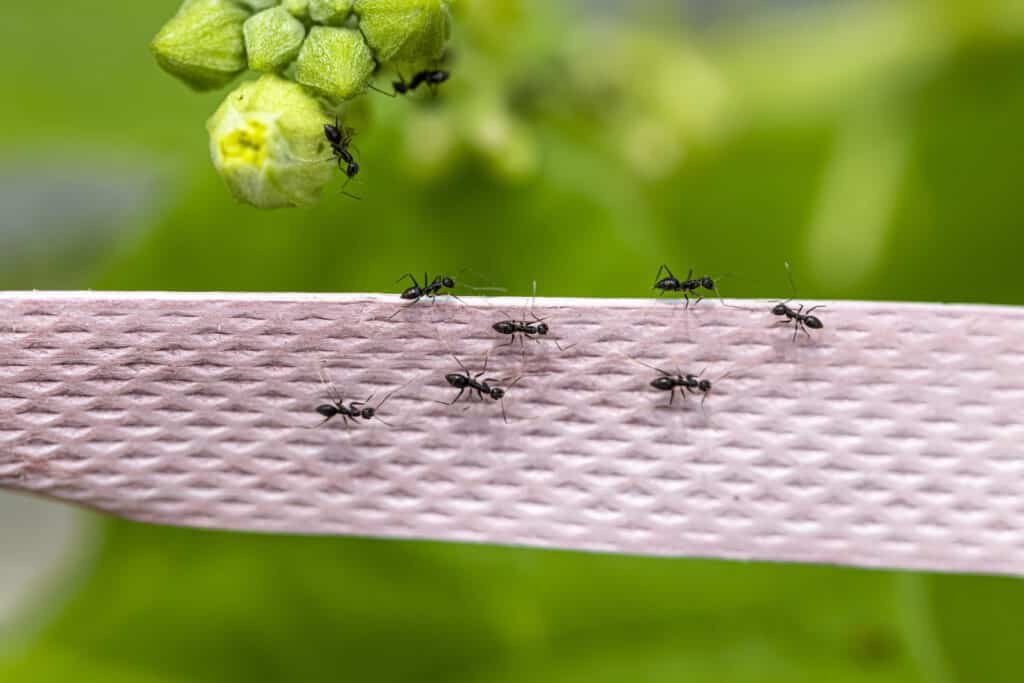Windex is a powerful glass cleaner but it’s also used as an insecticide against various pests including ants. But is it the right choice to kill those tiny creatures? Here’s the answer:
Windex can kill ants if sprayed sufficiently and directly on them. It’s the best way to kill ants when you have no insecticide available. Its smell will also repel other ants by clearing pheromones out of the dead ants’ bodies.
- One 23 fl oz bottle of Windex Original Glass Cleaner is a great home and car window cleaner solution that leaves an unbeatable streak-free shine**
- Window cleaner spray comes in a recycled plastic bottle made of 100% Recovered Coastal Plastic* in partnership with Plastic Bank
- This home and car glass cleaner starts working on smudges, dirt, fingerprints and other messes even before you wipe
- Trusted by generations, this glass cleaner spray lightens and brightens your home, leaving it sparkling clean
- This multipurpose cleaner is perfect for cleaning glass, windows, mirrors, stove tops, doors and more
Although its main job is cleaning, Windex is super useful as a pesticide too.
But is it the best solution in the long run? In this article, I’ll about how Windex kills ants, its effectiveness, and the alternatives.
Let’s find out!
How to Use Windex to Kill Ants?

Here’s how you can use Windex to kill ants:
- Locate the ants’ swarm.
- Spray Windex on ants directly.
- Spray on ants’ entry points.
- Soak the ants’ trail completely.
- Spray the areas where ants could potentially go.
Make sure that you’re not using Windex near the refrigerator, cooking, and food utensils. Although it’s not an insecticide, it’s still a cleaning product that’s not edible.
Read more: Does Windex Kill Wasps?
How Does Windex Kill Ants?
Windex kills ants by blocking their oxygen intake through spiracles (tiny holes on their back) and suffocating them to death. The detergent toxicity (ammonium hydroxide) is enough for ants to kill them.
Unlike Windex, Carbonate insecticides are used in many ant sprays. They inhibit the chemical acetylcholinesterase, which affects the ant’s nervous system and breaks their exoskeleton. The muscle fibers are essentially “over-stimulated,” causing paralysis and eventually death.
So basically, here is why Windex kills ants:
#1 Suffocation and Drowning
Windex blocks ants’ spiracles due to which they suffocate. Spiracles are small holes situated all over their body through which ants’ cells get oxygen. Once Windex cuts off their oxygen supply, no escape is left for them.
Ants’ body mass and surface area are too small — They’re able to float on water in most cases.
Windex has low surface tension because of alcohols and surfactants. Hence, ants immediately drown in it.
#2 Poisoning
Windex has an ingredient Ammonium Hydroxide that’s toxic to small insects such as ants and spiders. You can’t go wrong with Ammonia being in your ant spray.
Thanks to isopropanolamine, the chemical chokes ants and leaves a characteristic smell behind.
Is Using Windex Safe as an Ant Killer?
Windex is the safest ant killer because it is less toxic to humans than common insecticides. Windex is also eco-friendly and thus suitable for environmental sustainability. However, exposure to a large amount of Windex can be toxic to pets and children.
Is Windex safe to use against ants?
It depends on how you use it consistently — You can’t use Windex in the wrong way. So, don’t spray it on your floor or furniture because they will remain affected
If you’ve already done that, just rinse off the affected area with water to clean Windex residue and prevent secondary damage like rash breakout and rashes due to toxic chemicals such as Ammonia.
Windex also claims that it’s safe for plants but I wouldn’t recommend using it anywhere near plants.
While it might not be the first thing that comes to mind when you think of environmentally friendly products, Windex is actually a pretty green product. It is made with a non-toxic formula and is recyclable. Additionally, it does not contain any form of hazardous waste.
So, while Windex might not be the most ecological product on the market, it is still a pretty good option when it comes to killing ants.
Is Windex the Best Option for Killing Ants?
Windex is only suitable for killing ants less in numbers. If you’ve got a severe ant infestation in your house, use an insecticide or ant spray to eliminate ant colonies once and for all.
Household cleaners and air fresheners like Pine-Sol and Febreze will only help against ants on a limited scale.
Windex is great for killing a few ants here and there in your house. (You wouldn’t want to buy a whole ant spray for that, right?) — But what if ants keep coming back? And worse, more in numbers?
Use a well-reputed insecticide like Raid Ant & Roach Killer, Terro, or Diatomaceous Earth.
That being said, you wouldn’t want to use an insecticide inside the kitchen near food containers. For that, natural remedies like vinegar, borax, or pepper will help.
Is Windex the Cheapest Option for Killing Ants?
If you already own Windex and kill a few ants in your house occasionally, it’s the most economical solution for you (since you are not buying a whole new insecticide for the purpose). But, buying it solely as an ant killer would be expensive.
Conclusion
Windex is quite effective if you don’t have more than a handful of ants in your house. But if there are plenty of them, an insecticide might be a better solution for you.
How do you fight the ant problem? Let me know in the comments below!

